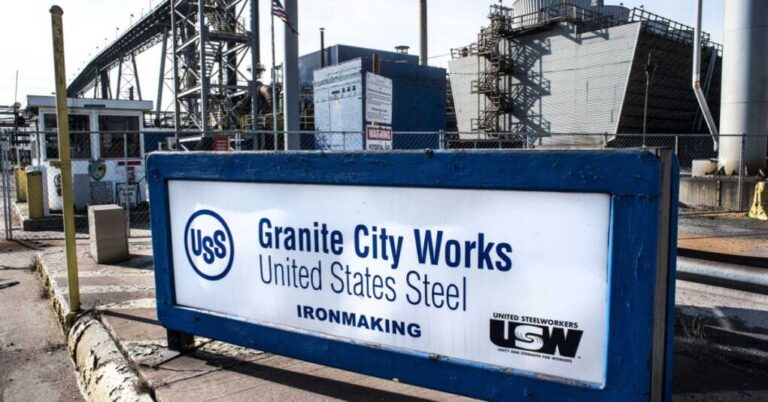
Here’s a headline that ought to make every American sit up and pay attention: U.S. Steel, one of the cornerstones of American industry, is being targeted for takeover by Nippon Steel, a Japanese conglomerate. The proposed $15 billion deal has sparked outrage from both sides of the political aisle, and for good reason. It’s not just about steel—it’s about who controls the backbone of our economy and, ultimately, our national security.
Let’s be clear: this isn’t just another business transaction. Steel is not some niche industry or luxury good. It’s the foundation of everything that makes a nation strong: our bridges, our buildings, our military. In short, steel equals sovereignty. And yet, here we are, debating whether to let a foreign company take control of one of America’s most iconic steelmakers, a company that helped build this nation and its defense infrastructure. What could possibly go wrong?
The politicians and corporate elites pushing this deal would have you believe it’s all perfectly harmless. “Globalization is good,” they’ll say. “Foreign investment strengthens the economy.” But let’s not kid ourselves. Selling off a critical industry to a foreign entity—especially one tied to a government with its own strategic interests—is not a recipe for economic strength. It’s a recipe for dependency. Do we really want to wake up one day and find that the steel used to build our tanks and aircraft carriers is being controlled by a boardroom in Tokyo?
Of course, the usual suspects are already lining up to support this deal. Wall Street loves it, because there’s money to be made. Corporate lobbyists love it, because they thrive on deals like this. And globalists love it, corporations float freely above the pesky concerns of national identity and security. But ordinary Americans? They see what’s happening here, and they’re not buying it.
This isn’t the first time we’ve seen critical industries put on the auction block for short-term gain. Remember when China got its hands on Smithfield Foods, the largest pork producer in the United States? That was spun as a “win-win” too—until it became clear that the deal wasn’t just about hogs, but about control over a vital piece of America’s food supply chain. The same script is being played out here with U.S. Steel, except this time, the stakes are even higher.
Here’s the real question: where does it end? If steel can be sold off, why not aerospace? Why not telecommunications? Why not entire industries that are critical to national defense and economic independence? At some point, we have to ask ourselves whether we’re willing to sacrifice the long-term stability and security of this nation for a quick buck. Because that’s what these deals ultimately boil down to: enriching a few people at the expense of the many.
And don’t fall for the argument that this is just capitalism in action. True capitalism rewards hard work and innovation; it doesn’t involve selling out your country’s infrastructure to foreign powers. What we’re seeing here isn’t capitalism—it’s cronyism disguised as progress. It’s a handful of elites making decisions that benefit themselves while leaving the rest of us to deal with the consequences.
Then there’s the issue of national security, which seems to have been conveniently swept under the rug in this debate. Steel isn’t just an economic asset; it’s a strategic one. It’s what makes our ships, our tanks, and our planes. It’s what keeps this country defended in times of crisis. Allowing foreign interests to control a significant portion of our steel production is the kind of decision that looks fine on paper until it’s time to build the next aircraft carrier and you realize you’re dependent on another nation’s goodwill.
What’s most infuriating is the lack of accountability. Who exactly is making the decisions here? It’s not the American worker, who stands to lose the most if this deal goes south. It’s not the small-town communities built around steel production, which will be gutted if jobs move overseas or operations are scaled down. No, it’s a handful of executives and politicians who are so far removed from the realities of everyday Americans that they might as well be living on another planet.
And let’s not forget the timing. At a moment when the global economy is increasingly unstable, when supply chains are fragile, and when geopolitical tensions are higher than they’ve been in decades, this is the moment we’re choosing to hand over control of a critical industry? It’s madness. Or maybe it’s not madness—maybe it’s just greed dressed up as innovation.
The American people deserve better. They deserve leaders who understand that national security and economic independence aren’t just talking points—they’re the foundation of everything we value as a country. They deserve a government that stands up for its citizens instead of bowing to the whims of multinational corporations. And they deserve industries that are run by people who actually have a stake in this nation’s success.
So here’s the bottom line: this isn’t just about steel. It’s about what kind of country we want to be. Do we want to be a nation that controls its own destiny, or one that sells off its future piece by piece? The choice is ours, but the clock is ticking. And if we don’t stand up and demand accountability now, we might wake up one day and realize we’ve traded our sovereignty for a handful of boardroom bonuses.









